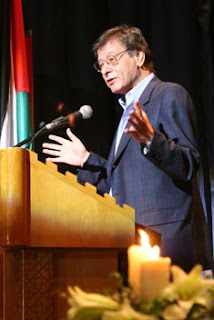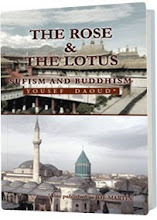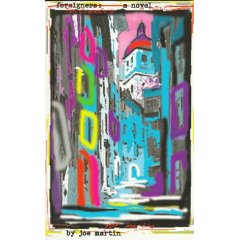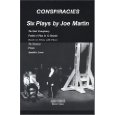
Joe Martin Cultural comment
Mahmoud Darwish's passing two years ago left a gap in world culture--for he was doing something extraordinary. His poetry never leaves the tradition of Love which the centuries of mostly Sufi poets bequeathed the Islamic world, though to many he appeared modern and somewhat secular. He was a voice calling for justice, but that voice was imbued with love. It was a love that could live in the mysteries of romance and eros, but which resonated in a way that transcended physical and even emotional love. So his sense of justice was imbued with the passion of that love.
As a child, Darwish's family village was destroyed during the establishment of the state of Israel, and like many they were forced to flee. Yet as a young adult he decided to find his way back, and live within Israel. Seeking a way of living in Israel, but to be able to express opposition, in 1961 he took the only route available that included Arabs and Jews, he joined the Communist Party of Israel. This, in historical retrospect, troubling decision puts him in the company of other artistic giants who doubled as proponents peace and justice in the twentieth century--Pablo Neruda, Diego Rivera, Pablo Picasso, Bertolt Brecht, James Baldwin, Nazim Hikmet and many others. But unlike some of them, the deep seated mystic sense of Love never seems to have left his work. Though it is unclear how much he himself acknowledged the influence of the ancient gnostic tradition of poetry, he writes of a love that fits with the love called "eshq"--borrowed by Arab poets from the Persian word for a love that was both passionate and spiritual.
The following description of Darwish's role comes from The Academy of American Poets (Poet.org), though Darwish was a resident of Ramallah on in the West Bank when he died. It is written by the poet Naomi Shihab:
"Mahmoud Darwish is the Essential Breath of the Palestinian people, the eloquent witness of exile and belonging, exquisitely tuned singer of images that invoke, link, and shine a brilliant light into the world's whole heart. What he speaks has been embraced by readers around the world—his in an utterly necessary voice, unforgettable once discovered."
One need only listen to, and read, the "Wait for Her," to understand his message, and the reason that Darwish's sense of Justice opens the heart, and gave the Arab world and the Palestinian people an opposition a humanistic voice they could feel inspired by, perhaps to the same degree they felt pride in the intellectual voice Edward Said. This poem shows how deeply "eshq" penetrated his work.
"Wait for Her"
Mahmoud Darwish's passing two years ago left a gap in world culture--for he was doing something extraordinary. His poetry never leaves the tradition of Love which the centuries of mostly Sufi poets bequeathed the Islamic world, though to many he appeared modern and somewhat secular. He was a voice calling for justice, but that voice was imbued with love. It was a love that could live in the mysteries of romance and eros, but which resonated in a way that transcended physical and even emotional love. So his sense of justice was imbued with the passion of that love.
As a child, Darwish's family village was destroyed during the establishment of the state of Israel, and like many they were forced to flee. Yet as a young adult he decided to find his way back, and live within Israel. Seeking a way of living in Israel, but to be able to express opposition, in 1961 he took the only route available that included Arabs and Jews, he joined the Communist Party of Israel. This, in historical retrospect, troubling decision puts him in the company of other artistic giants who doubled as proponents peace and justice in the twentieth century--Pablo Neruda, Diego Rivera, Pablo Picasso, Bertolt Brecht, James Baldwin, Nazim Hikmet and many others. But unlike some of them, the deep seated mystic sense of Love never seems to have left his work. Though it is unclear how much he himself acknowledged the influence of the ancient gnostic tradition of poetry, he writes of a love that fits with the love called "eshq"--borrowed by Arab poets from the Persian word for a love that was both passionate and spiritual.
The following description of Darwish's role comes from The Academy of American Poets (Poet.org), though Darwish was a resident of Ramallah on in the West Bank when he died. It is written by the poet Naomi Shihab:
"Mahmoud Darwish is the Essential Breath of the Palestinian people, the eloquent witness of exile and belonging, exquisitely tuned singer of images that invoke, link, and shine a brilliant light into the world's whole heart. What he speaks has been embraced by readers around the world—his in an utterly necessary voice, unforgettable once discovered."
One need only listen to, and read, the "Wait for Her," to understand his message, and the reason that Darwish's sense of Justice opens the heart, and gave the Arab world and the Palestinian people an opposition a humanistic voice they could feel inspired by, perhaps to the same degree they felt pride in the intellectual voice Edward Said. This poem shows how deeply "eshq" penetrated his work.
"Wait for Her"










